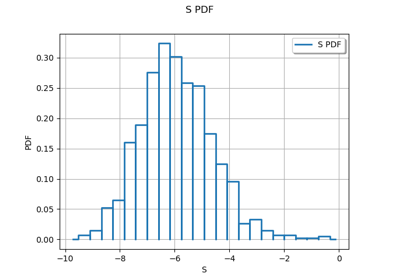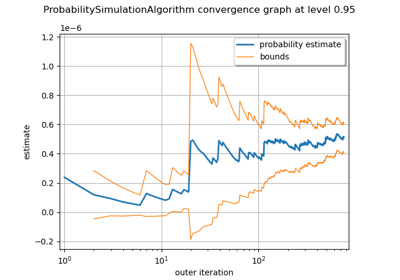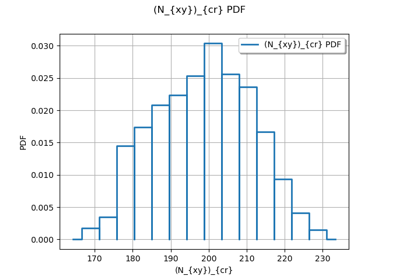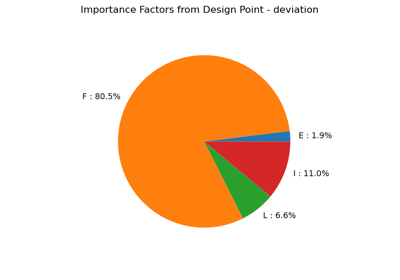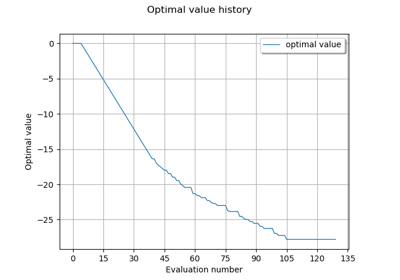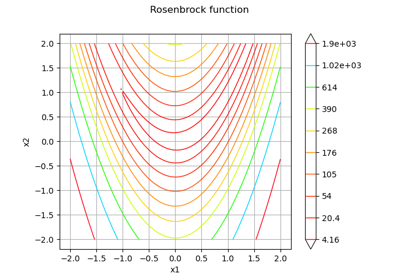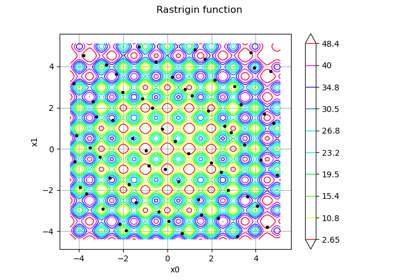Cobyla¶
- class Cobyla(*args)¶
Constrained Optimization BY Linear Approximations solver.
- Available constructors:
Cobyla(problem)
Cobyla(problem, rhoBeg)
- Parameters:
- problem
OptimizationProblem Optimization problem to solve.
- rhoBegfloat
A reasonable initial change to the variables.
- problem
See also
AbdoRackwitz,SQP,TNC,NLopt
Notes
It constructs successive linear approximations of the objective function and constraints via a simplex of
points, and optimizes these approximations in a trust region at each step. This solver use no derivative information and supports all types of constraints.
Examples
>>> import openturns as ot >>> model = ot.SymbolicFunction(['E', 'F', 'L', 'I'], ['-F*L^3/(3*E*I)']) >>> problem = ot.NearestPointProblem(model, 5.0) >>> algo = ot.Cobyla(problem) >>> algo.setMaximumCallsNumber(10000) >>> algo.setStartingPoint([1.0] * 4) >>> algo.run() >>> result = algo.getResult()
Methods
Accessor to check status flag.
Accessor to the object's name.
Accessor to maximum allowed absolute error.
Accessor to maximum allowed number of calls.
Accessor to maximum allowed constraint error.
Accessor to maximum allowed number of iterations.
Accessor to maximum allowed relative error.
Accessor to maximum allowed residual error.
Accessor to the maximum duration.
getName()Accessor to the object's name.
Accessor to optimization problem.
Accessor to optimization result.
Accessor to rhoBeg parameter.
Accessor to starting point.
hasName()Test if the object is named.
run()Launch the optimization.
setCheckStatus(checkStatus)Accessor to check status flag.
setMaximumAbsoluteError(maximumAbsoluteError)Accessor to maximum allowed absolute error.
setMaximumCallsNumber(maximumCallsNumber)Accessor to maximum allowed number of calls
setMaximumConstraintError(maximumConstraintError)Accessor to maximum allowed constraint error.
setMaximumIterationNumber(maximumIterationNumber)Accessor to maximum allowed number of iterations.
setMaximumRelativeError(maximumRelativeError)Accessor to maximum allowed relative error.
setMaximumResidualError(maximumResidualError)Accessor to maximum allowed residual error.
setMaximumTimeDuration(maximumTime)Accessor to the maximum duration.
setName(name)Accessor to the object's name.
setProblem(problem)Accessor to optimization problem.
setProgressCallback(*args)Set up a progress callback.
setResult(result)Accessor to optimization result.
setRhoBeg(rhoBeg)Accessor to rhoBeg parameter.
setStartingPoint(startingPoint)Accessor to starting point.
setStopCallback(*args)Set up a stop callback.
getIgnoreFailure
getMaximumEvaluationNumber
setIgnoreFailure
setMaximumEvaluationNumber
- __init__(*args)¶
- getCheckStatus()¶
Accessor to check status flag.
- Returns:
- checkStatusbool
Whether to check the termination status. If set to False,
run()will not throw an exception if the algorithm does not fully converge and will allow one to still find a feasible candidate.
- getClassName()¶
Accessor to the object’s name.
- Returns:
- class_namestr
The object class name (object.__class__.__name__).
- getMaximumAbsoluteError()¶
Accessor to maximum allowed absolute error.
- Returns:
- maximumAbsoluteErrorfloat
Maximum allowed absolute error, where the absolute error is defined by
where
and
are two consecutive approximations of the optimum.
- getMaximumCallsNumber()¶
Accessor to maximum allowed number of calls.
- Returns:
- maximumEvaluationNumberint
Maximum allowed number of direct objective function calls through the () operator. Does not take into account eventual indirect calls through finite difference gradient calls.
- getMaximumConstraintError()¶
Accessor to maximum allowed constraint error.
- Returns:
- maximumConstraintErrorfloat
Maximum allowed constraint error, where the constraint error is defined by
where
is the current approximation of the optimum and
is the function that gathers all the equality and inequality constraints (violated values only)
- getMaximumIterationNumber()¶
Accessor to maximum allowed number of iterations.
- Returns:
- maximumIterationNumberint
Maximum allowed number of iterations.
- getMaximumRelativeError()¶
Accessor to maximum allowed relative error.
- Returns:
- maximumRelativeErrorfloat
Maximum allowed relative error, where the relative error is defined by
if
, else
.
- getMaximumResidualError()¶
Accessor to maximum allowed residual error.
- Returns:
- maximumResidualErrorfloat
Maximum allowed residual error, where the residual error is defined by
if
, else
.
- getMaximumTimeDuration()¶
Accessor to the maximum duration.
- Returns:
- maximumTimefloat
Maximum optimization duration in seconds.
- getName()¶
Accessor to the object’s name.
- Returns:
- namestr
The name of the object.
- getProblem()¶
Accessor to optimization problem.
- Returns:
- problem
OptimizationProblem Optimization problem.
- problem
- getResult()¶
Accessor to optimization result.
- Returns:
- result
OptimizationResult Result class.
- result
- getRhoBeg()¶
Accessor to rhoBeg parameter.
- Returns:
- rhoBegfloat
A reasonable initial change to the variables.
- hasName()¶
Test if the object is named.
- Returns:
- hasNamebool
True if the name is not empty.
- run()¶
Launch the optimization.
- setCheckStatus(checkStatus)¶
Accessor to check status flag.
- Parameters:
- checkStatusbool
Whether to check the termination status. If set to False,
run()will not throw an exception if the algorithm does not fully converge and will allow one to still find a feasible candidate.
- setMaximumAbsoluteError(maximumAbsoluteError)¶
Accessor to maximum allowed absolute error.
- Parameters:
- maximumAbsoluteErrorfloat
Maximum allowed absolute error, where the absolute error is defined by
where
and
are two consecutive approximations of the optimum.
- setMaximumCallsNumber(maximumCallsNumber)¶
Accessor to maximum allowed number of calls
- Parameters:
- maximumEvaluationNumberint
Maximum allowed number of direct objective function calls through the () operator. Does not take into account eventual indirect calls through finite difference gradient calls.
- setMaximumConstraintError(maximumConstraintError)¶
Accessor to maximum allowed constraint error.
- Parameters:
- maximumConstraintErrorfloat
Maximum allowed constraint error, where the constraint error is defined by
where
is the current approximation of the optimum and
is the function that gathers all the equality and inequality constraints (violated values only)
- setMaximumIterationNumber(maximumIterationNumber)¶
Accessor to maximum allowed number of iterations.
- Parameters:
- maximumIterationNumberint
Maximum allowed number of iterations.
- setMaximumRelativeError(maximumRelativeError)¶
Accessor to maximum allowed relative error.
- Parameters:
- maximumRelativeErrorfloat
Maximum allowed relative error, where the relative error is defined by
if
, else
.
- setMaximumResidualError(maximumResidualError)¶
Accessor to maximum allowed residual error.
- Parameters:
- maximumResidualErrorfloat
Maximum allowed residual error, where the residual error is defined by
if
, else
.
- setMaximumTimeDuration(maximumTime)¶
Accessor to the maximum duration.
- Parameters:
- maximumTimefloat
Maximum optimization duration in seconds.
- setName(name)¶
Accessor to the object’s name.
- Parameters:
- namestr
The name of the object.
- setProblem(problem)¶
Accessor to optimization problem.
- Parameters:
- problem
OptimizationProblem Optimization problem.
- problem
- setProgressCallback(*args)¶
Set up a progress callback.
Can be used to programmatically report the progress of an optimization.
- Parameters:
- callbackcallable
Takes a float as argument as percentage of progress.
Examples
>>> import sys >>> import openturns as ot >>> rosenbrock = ot.SymbolicFunction(['x1', 'x2'], ['(1-x1)^2+100*(x2-x1^2)^2']) >>> problem = ot.OptimizationProblem(rosenbrock) >>> solver = ot.OptimizationAlgorithm(problem) >>> solver.setStartingPoint([0, 0]) >>> solver.setMaximumResidualError(1.e-3) >>> solver.setMaximumCallsNumber(10000) >>> def report_progress(progress): ... sys.stderr.write('-- progress=' + str(progress) + '%\n') >>> solver.setProgressCallback(report_progress) >>> solver.run()
- setResult(result)¶
Accessor to optimization result.
- Parameters:
- result
OptimizationResult Result class.
- result
- setRhoBeg(rhoBeg)¶
Accessor to rhoBeg parameter.
- Parameters:
- rhoBegfloat
A reasonable initial change to the variables.
- setStartingPoint(startingPoint)¶
Accessor to starting point.
- Parameters:
- startingPoint
Point Starting point.
- startingPoint
- setStopCallback(*args)¶
Set up a stop callback.
Can be used to programmatically stop an optimization.
- Parameters:
- callbackcallable
Returns an int deciding whether to stop or continue.
Examples
>>> import openturns as ot >>> rosenbrock = ot.SymbolicFunction(['x1', 'x2'], ['(1-x1)^2+100*(x2-x1^2)^2']) >>> problem = ot.OptimizationProblem(rosenbrock) >>> solver = ot.OptimizationAlgorithm(problem) >>> solver.setStartingPoint([0, 0]) >>> solver.setMaximumResidualError(1.e-3) >>> solver.setMaximumCallsNumber(10000) >>> def ask_stop(): ... return True >>> solver.setStopCallback(ask_stop) >>> solver.run()
Examples using the class¶

Use the post-analytical importance sampling algorithm
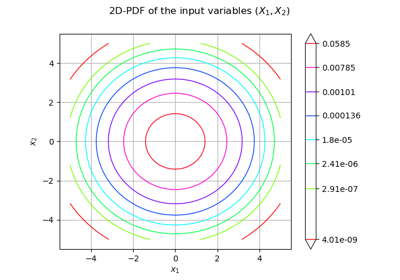
Use the FORM algorithm in case of several design points

Test the design point with the Strong Maximum Test
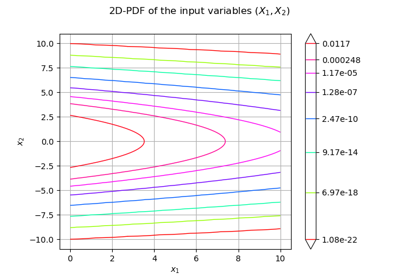
An illustrated example of a FORM probability estimate
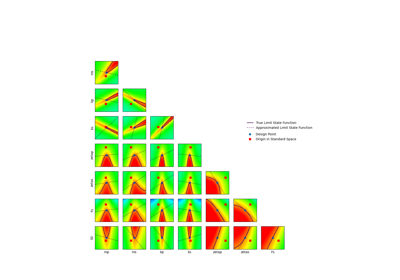
Using the FORM - SORM algorithms on a nonlinear function
 OpenTURNS
OpenTURNS
